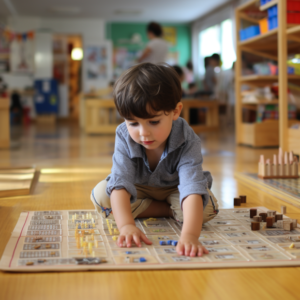The first few years of a child’s life are critical for their overall development. It is during this time that the foundations for learning, behavior, and social interactions are laid. Montessori education, renowned for its child-centered approach and focus on holistic development, plays a pivotal role in shaping a child’s early years. In this article, we will explore the importance of Montessori education in the first years of a child’s life and how it sets the stage for lifelong learning.
- Respect for the Child’s Individuality
Montessori education respects the unique needs, abilities, and interests of each child. By providing a nurturing environment where children are encouraged to explore and discover at their own pace, Montessori supports their natural development. - Fostering Independence and Self-Confidence
In a Montessori setting, children are encouraged to engage in purposeful activities that promote independence. By allowing children to make choices and take responsibility for their actions, Montessori instills a sense of self-confidence and self-reliance. - Development of Motor Skills and Coordination
Montessori materials and activities are carefully designed to enhance a child’s fine and gross motor skills. From pouring water to manipulating small objects, these exercises refine hand-eye coordination and strengthen essential motor skills. - Cultivating a Love for Learning
The Montessori method nurtures a love for learning from an early age. By providing a prepared environment that sparks curiosity and fosters a sense of wonder, children naturally develop a joy for exploring the world around them. - Emphasis on Sensory Exploration
Montessori education places great importance on sensory exploration. Through sensory activities, children develop their five senses, laying a solid foundation for future academic and cognitive growth. - Building Social and Emotional Skills
Montessori classrooms promote a peaceful and cooperative environment where children learn to interact with one another respectfully. This fosters the development of essential social and emotional skills, such as empathy, communication, and conflict resolution. - Encouraging a Lifelong Love for Learning
By instilling a growth mindset and a love for discovery, Montessori education sets the stage for a lifelong passion for learning. Children who experience the joy of learning in their early years are more likely to become self-motivated learners in the future. - Nurturing a Strong Sense of Community
In Montessori classrooms, children learn to work collaboratively and respect the contributions of others. This sense of community fosters a positive classroom culture and prepares children to become responsible global citizens.
Conclusion:
Montessori education in the first years of a child’s life lays the groundwork for a lifetime of learning and personal growth. By fostering independence, cultivating a love for learning, and nurturing social and emotional development, Montessori provides children with a strong foundation for success in both academic and life pursuits. The significance of Montessori education in early childhood cannot be overstated, as it shapes not only the child’s academic journey but also their character, confidence, and curiosity for the world around them.

